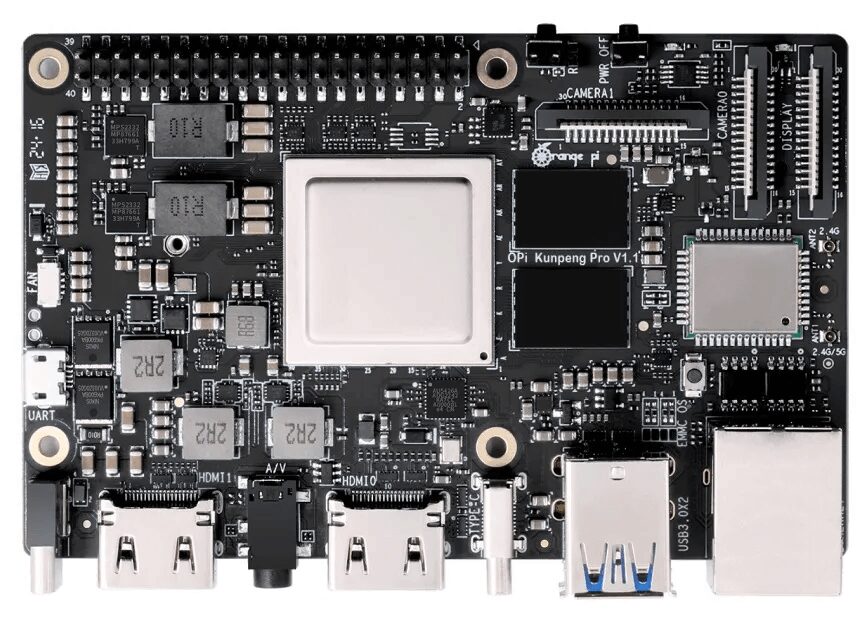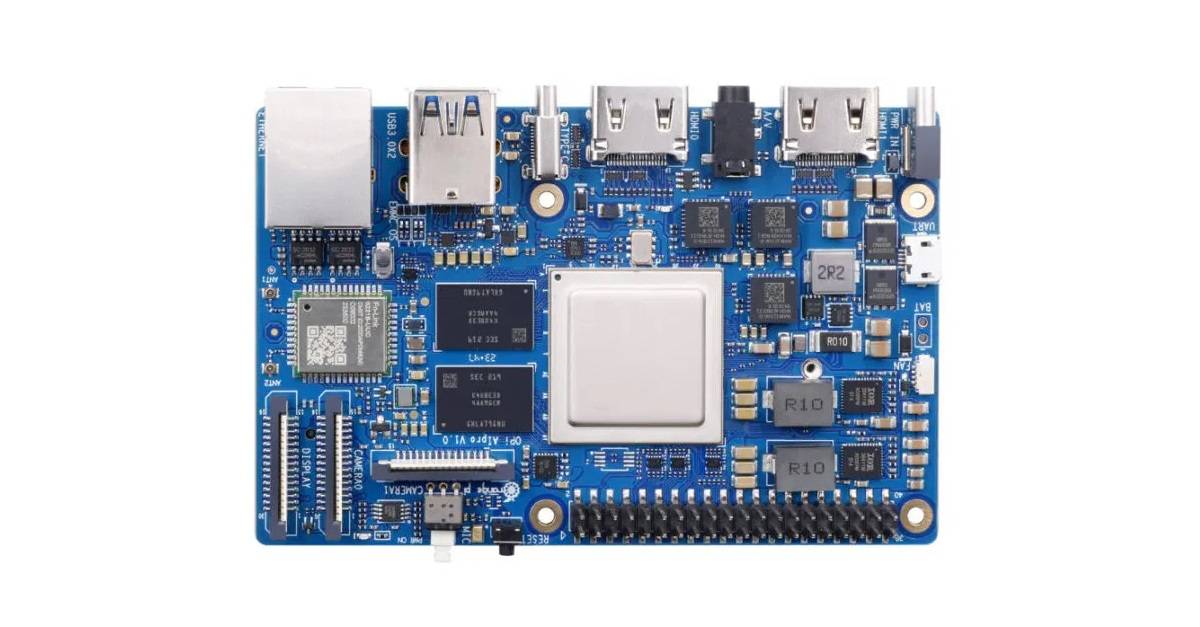- Maybe you missed it? Orange Pi X
- Get the scoop and an in-depth review on the highly anticipated Orange Pi AIpro.
What’s new in the upcoming Orange Pi AIpro?
There’s an exciting new development on the horizon – Huawei Ascend’s low-level AI Chip will be incorporated into the upcoming Orange Pi AIpro single-board computer. This innovative integration is set to provide a highly affordable and efficient solution for AI and deep learning applications.
Thanks to a new partnership between Huawei and Shenzhen Xunlong Software Co., Ltd., incredible results have been achieved. The new Alpro SBC combines Huawei’s cutting-edge Ascend AI technology with an impressive computing power of 8/20 TOPS with a lower energy footprint. Which makes it ideal for low and mid-level AI applications.

What does “8/20 TOPS computing power” mean?
The term “TOPS” stands for “Tera Operations Per Second,” and it is a measure of computing performance in terms of the number of trillion operations a system can perform per second. In the context of computing power, particularly in the field of artificial intelligence (AI) and machine learning, TOPS is often used to quantify the processing capability for tasks like neural network inference.
In the expression “8/20 TOPS,” the numerator (8) represents the actual computing power or throughput, while the denominator (20) represents the theoretical peak performance or the maximum number of operations the system could potentially handle under ideal conditions.
So, in this example, a computing power of 8/20 TOPS means that the system is capable of performing 8 trillion operations per second in real-world scenarios, and its theoretical peak performance could be up to 20 trillion operations per second under ideal conditions. This ratio provides an indication of how efficiently the system can execute computational tasks, especially relevant in applications such as AI inference where the processing of large amounts of data is common.
Orange Pi and Ascend have joined forces in a groundbreaking partnership at the prestigious Computer Education Conference of China (CECC).

Examining the board more closely

What do we know about the Chip?
Huawei’s Ascend 300 processor series
Huawei’s Ascend 300 processor series are produced in a 12 nm manufacturing process, and it will be most likely to be used with the new Orange Pi AIpro SBC. With remarkable efficiency, flexibility, and programmability, this cutting-edge technology boasts exceptional performance while maintaining low power consumption. As depicted in the photo below, its power usage is a mere 8W in the Ascend 310 series, making it the perfect selection for SBCs.
Da Vinci Architecture
The architecture of Da Vinci acts as a strong foundation for the Ascend layer, offering a cohesive and adaptable framework that encompasses both low-energy usage and high-performance computing scenarios. What truly distinguishes Da Vinci is its remarkable capability to facilitate the deployment, migration, and collaboration of AI applications across multiple scenarios concurrently. This crucial aspect magnifies the efficiency of software development and expedites the progress of AI applications in countless industries.

Nvidia faces growing competition in the AI chip sector.
A month ago, Baidu made a strategic move by placing an order for AI chips from Huawei, clearly indicating their intention to move away from Nvidia and focus on domestic chip production. In their pursuit, Baidu ordered a substantial quantity of 1,600 of Huawei Technologies’ 910B Ascend AI chips, the total value of which was approximately 450 million yuan ($61.83 million) developed as a formidable alternative to Nvidia’s A100 chip. To power their servers, Baidu received a remarkable delivery from Huawei, with over 60% of the order fulfilled by October, equating to approximately 1,000 chips.
The order may seem small compared to the large quantities of chips that top Chinese tech firms have typically purchased from Nvidia in the past. However, sources have emphasized its importance, as it indicates a potential shift away from reliance on the U.S. companies.
Front and back views of the Orange Pi AIpro board


Ascend hardware platform
Huawei has a cutting-edge product line based on the Ascend hardware platform. This innovative AI chip boasts a diverse range of applications, including image classification, target detection, image processing, gesture recognition, and much more. With its advanced capabilities, it enables robots to excel in various tasks and facilitates the fusion of natural language processing and computer vision. Additionally, it supports AR shadow generation, instance splitting, NLP, and pattern recognition, making it a game-changer in the field of technology.
Comprehensive software support for developing AI applications.
The Acend platform is equipped to handle a wide range of AI frameworks, making it a versatile choice for developers. Some of the supported frameworks include MindX DL, MindX Edge, ModelZoo, MindX SDK, and MindSpore. In addition, the platform offers seamless integration with third-party frameworks and supports heterogeneous computing architecture. With tools like CANN and a full-pipeline development toolchain like MindStudio, developers can access a comprehensive suite of resources for their AI applications.

Hardware
Equipped with a powerful 4-core 64-bit processor and dedicated AI and graphics processors, the Orange Pi AIpro has attractive specs worth checking out. It not only supports dual 4K output for an extraordinary visual experience, but also offers the convenience of accommodating eMMC modules with up to 256 GB of storage. When it comes to memory configurations, you can choose between a generous 8 GB or an impressive 16 GB of LPDDR4X RAM.You have the choice between 8 GB or 16 GB LPDDR4X RAM memory configuration.
Moreover, the AIpro development board provides a wide range of interfaces that offer exceptional versatility. These interfaces include a GPIO header, HDMI ports, an M.2 slot that supports NVMe 2280 SSDs (such as the incredible Crucial P3 4TB, currently available for just US$199.95 on Amazon), USB Type-C and Type-A ports, and a TF slot.
In addition, the Orange Pi AIpro provides excellent support for openEuler and Ubuntu operating systems. Moreover, it fulfills all the necessary criteria for AI algorithm prototype verification and reasoning application development.
Small Form Factor
The Orange Pi AIpro’s dimensions are 107 x 68 mm (4.21 x 2.68 inches), which makes it comparable to the Orange Pi 5. It does, however, occupy a larger footprint than the Raspberry Pi 5, which measures 85 x 56 mm (3.45 x 2.2 inches).
Orange Pi AIpro Price and Availability
During the pre-sale phase, you can grab the board equipped with a whopping 8 GB of RAM for just CNY889, which translates to a shockingly low price of $125. Furthermore, the Orange Pi AIpro elevates its performance with a remarkable 16 GB RAM, all while maintaining an affordable price tag of CNY1149, which is approximately $162.




